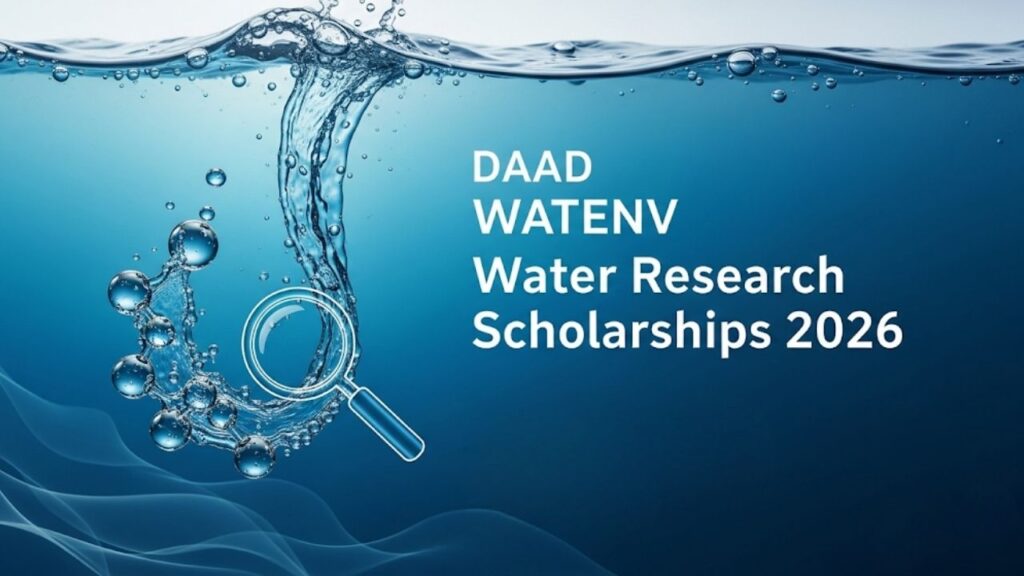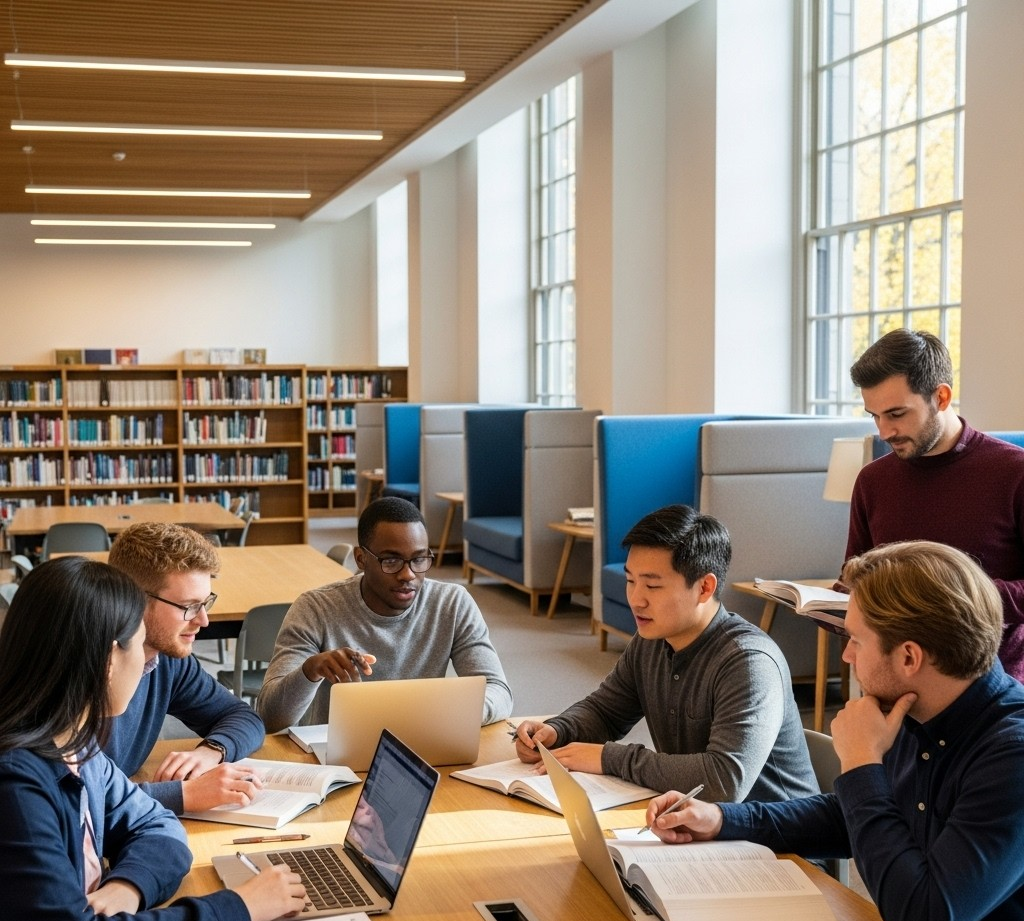The DAAD WATENV Water Research Scholarships 2026 offer a golden opportunity for young professionals from developing countries to pursue a fully funded Master’s degree in Germany. If you’re passionate about tackling global water challenges and want to gain a world-class education, this guide is your first step. We’ll break down the eligibility, benefits, and application process into simple, actionable steps, transforming a complex process into a clear path forward. Let’s get you ready to make a real-world impact.

DAAD WATENV Water Research Scholarships 2026
| Feature | Detail | Why It Matters |
| Complete Financial Coverage | Includes a €934 monthly stipend, travel allowance, health insurance, and study subsidies. | This allows you to focus entirely on your studies and research without financial stress. |
| Host Institution | The M.Sc. program is hosted at the prestigious Leibniz University Hannover. | You’ll learn at a leading German technical university known for its excellence in engineering and environmental sciences. |
| Target Audience | Professionals with at least two years of experience from eligible developing countries. | The program is specifically designed to empower future leaders who can implement change back home. |
| Application Deadline | The typical deadline is September 30, 2025, for the intake beginning in winter 2026. | Starting your preparation early is crucial for a competitive application. |
The DAAD WATENV Water Research Scholarship is more than just funding; it’s an investment in your potential to become a global leader. The application process requires dedication and attention to detail, but the reward is a life-changing educational and professional experience. By starting your preparation now, you are taking the first, most important step toward achieving your goals.
What Exactly is the DAAD WATENV Scholarship?
This isn’t just any scholarship; it’s a key component of the DAAD’s renowned “Development-Related Postgraduate Courses” (EPOS) program. The official M.Sc. program title is “Water Resources and Environmental Management” (WATENV). Its mission is to train specialists from around the globe to develop sustainable solutions for the water sector.
Think of it as a leadership accelerator. You’re not just earning a Master of Science degree; you’re joining a network of experts dedicated to addressing critical issues like water scarcity, pollution, and climate change adaptation. The program, taught entirely in English at Leibniz University Hannover, is designed to be highly practical, blending cutting-edge theory with real-world application.
Are You the Ideal Candidate? Key Eligibility Criteria
Before you dive into the application, it’s essential to see if you fit the profile. DAAD and the university have specific requirements to ensure they select candidates who can truly benefit from and contribute to the program.
Academic Background
You must hold a Bachelor’s degree (B.Sc.) in a relevant field.2 This typically includes:
- Civil Engineering
- Natural Sciences (e.g., Geology, Geography)
- Environmental Engineering
- Or other closely related disciplines.
Professional Experience
This is a non-negotiable requirement. Applicants must have at least two years of proven, relevant professional experience after their first degree. The program is designed for practitioners who can bring their work experience into the classroom and apply their new knowledge directly in their future careers.
Country of Origin
The scholarship targets applicants from developing and newly industrialized countries. You must be a citizen of a nation on the official DAAD EPOS list of eligible countries.
Language Skills
Since the program is taught in English, you need to prove your proficiency. Accepted tests and minimum scores are typically:
- IELTS: A band score of 6.5 or higher.
- TOEFL iBT: A score of 80 or higher.
Always check the official WATENV program page for the most current score requirements.

Unpacking the Financial Benefits: What’s Included?
“Fully funded” is a term that gets used a lot, but the DAAD EPOS program truly delivers comprehensive financial support. Successful applicants can expect:
- Monthly Stipend: A payment of €934 to cover living expenses, accommodation, and food.
- Health Insurance: Full coverage from a German health insurance provider.
- Travel Allowance: A lump sum to cover your flight to Germany and back home.
- Study and Research Subsidy: An annual allowance for books, materials, and other academic needs.
- German Language Course: Often, a 2-6 month intensive German course is provided before the Master’s program begins. This is an incredible opportunity to immerse yourself in the culture and make daily life easier.
Guide to Applying for the DAAD WATENV Scholarship
Navigating the application can feel daunting, but breaking it down makes it manageable. Follow these steps for a smooth and successful submission.
Step 1: Verify Eligibility and Deadlines (Now!)
The most important first step is to carefully read the latest requirements on both the DAAD EPOS database and the official WATENV page at Leibniz University Hannover. Deadlines are strict. For the 2026 intake, your target for submission is September 30, 2025.
Step 2: Prepare Your Essential Documents
Gathering your documents is the most time-consuming part, so start now. Create a folder and use this as your checklist:
- Signed DAAD Application Form: Downloaded from the DAAD website.
- Curriculum Vitae (CV): Signed and dated. Using the Europass CV format is highly recommended.
- Letter of Motivation: A one-to-two-page essay explaining your reasons for applying. This is your most important document!
- Letters of Recommendation: You’ll need at least one from your current employer and one from a university professor. They must be on official letterhead, signed, and stamped.
- Academic Certificates: Official copies of your Bachelor’s degree and transcripts.
- Proof of Professional Experience: A letter from your employer(s) confirming your role and duration of employment.
- Proof of English Proficiency: Your official IELTS or TOEFL score report.
Step 3: Craft a Winning Letter of Motivation
Your Letter of Motivation is where you come to life. It’s your chance to tell a compelling story that connects your past, present, and future. In my experience advising students, the strongest letters don’t just state a desire to study; they build a logical bridge. Clearly connect specific problems you’ve encountered in your professional work to specific modules or research areas in the WATENV curriculum. Explain how gaining this knowledge in Germany will equip you to return home and implement tangible solutions.
Step 4: Submit Your Complete Application
For the WATENV program, you submit one complete application package directly to Leibniz University Hannover, not to the DAAD. This is a common point of confusion. The university conducts the initial pre-selection and then forwards the top candidates to DAAD for the final scholarship decision. Ensure your package is mailed and arrives before the deadline.

Life as a WATENV Scholar in Hannover
Hannover is a green, welcoming, and surprisingly affordable German city. It’s large enough to be exciting but small enough to feel like home. As a student at Leibniz University, you’ll be part of a vibrant international community. The WATENV program fosters a close-knit environment where you’ll collaborate with peers from over 20 different countries, building a professional network that will last a lifetime.
Your Complete Guide to Fully Funded PhD Scholarships Abroad 2026
International Visegrad Fund Grants 2025: Fuel Your Project’s Impact
FAQs
Q1:Do I apply to DAAD or the university?
For this specific EPOS program (WATENV), you send your complete application directly to Leibniz University Hannover before their deadline. They handle the first round of selections.
Q2:Is knowing German mandatory for the application?
No. The Master’s program is conducted entirely in English. However, the DAAD scholarship includes a German language course to help you integrate into daily life in Germany, which is a fantastic benefit.
Q3:Can I apply if my Bachelor’s degree was completed more than six years ago?
Generally, no. The DAAD EPOS program requires that your most recent academic degree was obtained within the last six years at the time of application.
Q4:Can I work part-time while on the scholarship?
DAAD scholarships are intended to be full-time commitments. While some limited part-time work may be possible under certain conditions, it is often restricted and should not be relied upon for income. The stipend is designed to cover your living costs.










